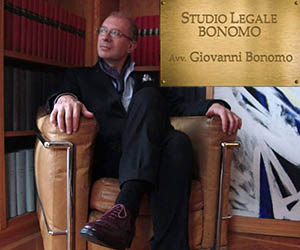![]() Special by
Special by
Antonio Mazzeo
March 12, 2018. In Doha, the capital of Qatar, “Dimdex”, the international fair of naval warfare systems, is underway. The Italian stand is one of the largest and most visited: the latest technological innovations of the military-industrial complex produced are on display.
The Farnesina and the Ministry of Defence have done things on a grand scale and as the best ambassador of Made in Italy, the multi-role FREMM class frigate “Carlo Margottini”, a Navy unit built by Fincantieri and super-armed by Leonardo-Finmeccanica, has been transferred to the Emirate.
In a roadstead in the port of Hamad, the “Margottini” hosted the summit between the then (outgoing) minister Roberta Pinotti and the Minister for Defence Affairs of Qatar, Khalid Bin Mohammed Al Attiyah, also president of Barzan Holdings, the government company in charge of research, production and marketing of weapons and strategic systems.

“With Qatar we are building an increasingly important relationship on security issues that allows us to strengthen and consolidate bilateral military cooperation,” said Roberta Pinotti. “With Minister Al Attiyah we shared the concern about the crisis in Libya and dwelt on developments in the countries on the southern shore of the Mediterranean and in the Middle East, a geo-strategic scenario of common interest”.
After the meeting, still on the “Margottini”, the Italian Ambassador to Qatar, Pasquwle Salzano, the Navy Chief of Staff, Admiral Valter Girardelli and the Head of the Naval Armaments Directorate (Navarm), Admiral Matteo Bisceglia, invited the heads of the Qatari armed forces and journalists present at “Dimdex” to a meeting party.
Among the guests of honour aboard the unit, Leonardo’s CEO, Alessandro Profumo and the then president of the association of Italian aerospace companies AIAD, Guido Crosetto, former undersecretary of Defence in the 4th Berlusconi government and current national coordinator of Fratelli d’Italia. Between a drink and the usual exchanges of greetings and thanks, the signing of an agreement for the creation of a joint venture in the light weapons sector between the historic Brescian group Beretta and Barzan Holdings was announced.
The agreement provided for the company, chaired by Pietro Gussalli Beretta, to collaborate with the military authorities of the Emirate in the construction of a plant in the technological-scientific park of Doha (with annexed laboratories and research centre) for the production of assault rifles and pistols and the development of new weapon systems. The Brescian group was given the minority share of the joint venture called “Bindig”, the term used in Qatar to refer to rifles.
“I would like to underline how this agreement is extremely important because it is the first time that a joint venture of this kind has been established in an Arab country and Beretta has chosen Qatar for the project,” said Ambassador Pasquale Salzano, one of the most committed intermediaries in the business. Sarzano, in December 2019, returned to Italy to head the international affairs department of the Cassa Depositi e Prestiti of the Ministry of the Economy and also assume the chairmanship of Simest S.p.A., a public-private company that promotes Italian business investment abroad.
“Beretta Group and Barzan Holdings have pooled their resources to launch an industrial project that can respond to the requests of the Qatari armed forces to equip themselves with the most up-to-date individual armaments and be able to develop new light weapons systems in the future,” added Carlo Festucci, Secretary General of AIAD.
Thanks to the joint venture, the Brescia-based group aims to expand its business in the flourishing Arab market. “We will bring a part of our production to Qatar, the agreement is strategic for the entire Middle East area and demonstrates how reliable we are as a reliable partner”, Beretta’s management warmly commented.
Ready for production are the AR160A3 5.56 × 45 mm NATO assault rifles (already in force with the Italian troops in Afghanistan), the 92A1 7.62 calibre semi-automatic pistols and the new APX semi-automatic rifles designed in the “Pietro Beretta” laboratories in Gardone Valtrompia. A first batch of weapons produced by “Binding” is destined for the Qatari army: 30,000 ARX-160 rifles, plus an unspecified number of ARX-200 pistols, estimated value of the order at 200 million dollars.

For ammunition, the Ministry of Defence of the Emirate has instead set up another jont venture in Doha between the subsidiary Barzan Holdings and the German giant Rheinmetall, well established in our country thanks to the Rheinmetall Italia S. plants. p.A. in Rome (formerly Oerlikon-Contraves), specialized in radar and targeting systems, and those of RWM Italia S.p.A. in Ghedi (Bs) and Domusnovas in Sardinia, known for producing the warheads used in Yemen by Saudi Arabian fighter bombers. The Beretta 92 automatic pistols and the ARX200 assault rifles have already been delivered last year to the armed forces of the Emirate. The baptism of fire of the ARXs took place during the international maxi-exercise “Eager Lion” held in August 2019 in Jordan and attended by 8,000 soldiers from 30 countries including Italy (the special forces of the 4th and 185th Army Paratroop Regiment and a company of the 1st Regiment “San Marco” of the Navy).

The Beretta-Qatar connection, unanimously supported by the political forces and the industrial-military establishment, was pointed the finger by the researchers of the Permanent Observatory on Light Weapons and Security and Defence Policies (OPAL) in Brescia, who were strongly concerned that production in Doha could escape the controls on war exports provided for by the regulations. “Qatar has not signed the Arms Trade Treaty in force at the United Nations since December 24, 2014,” OPAL reported in a note in spring 2018. “This treaty has established strict criteria to regulate legitimate arms transfers, to prevent arms exports that may threaten common security and, above all, to try to prevent their diversion to the illicit market and for unauthorised purposes and end uses, including the commission of terrorist acts”.
The possibility of having technologies and light weapons produced by a controversial regime such as the Qatar regime can only multiply the dangers of triangulations and transfers to belligerent countries and/or criminal armed groups operating in the Middle East and the African continent.
All in blatant violation of the same law n. 185 of 1990, which regulates all the authorizations for the export or production abroad of military materials, which “must be in conformity with the foreign and defence policy of Italy (…) according to the principles of the Republican Constitution which repudiates war as a means of resolving international controversies”.

At the Brescia Light Weapons Observatory, the government took great care to provide any assurance and/or justification for the Beretta – Barzan Holdings agreement. However, a couple of months later, the Italian Embassy in Qatar once again took care of blessing the new frontier in the export of rifles and pistols. The Pietro Beretta Arms Factory was called upon to act as gold sponsor of the Italian Republic Day organised in Doha on 2 June 2018, in the presence of the highest civil and military authorities of the Emirate.
On October 31, 2018, the Italian system would have honoured in the best possible way another Qatar industrial-military kermesse, “Milipol”, on internal security systems and “civil defence”, with the official visit to Doha by the newly appointed Minister of the Interior and Vice-President of the Council, Matteo Salvini. “Minister Salvini met the Emir of Qatar, Sheikh Tamim bin Hamad Al Thani, the Prime Minister and Minister of the Interior, Sheikh Abdullah bin Nasser bin Khalifa Al Thani, and the Minister of Foreign Affairs, Sheikh Mohammed bin Abdulrahman bin Jassim Al Thani”, reads the Farnesina communiqué. “The talks also focused on regional dossiers of major interest, including the situation in Libya. The Minister also met representatives of Italian companies present at the Milipol international trade fair, including Beretta, Elettronica and Cristanini, and later the Salini Impregilo metro construction site.
Minister Salvini’s visit ended with a ceremony on board the frigate Federico Martinengo, the Italian Navy ship engaged in the EU anti-piracy operation Atalanta, where he met the Italian community living in Qatar”. Governments are overturned but the music is always the same: all-round assistance in favour of the production of death made in Italy. Even if the revenues and earnings of companies end up in some tax haven more and more often.
Beretta Holding, for example, has moved its official headquarters to Luxembourg, where it also founded Upifra, a real financial safe for arms companies in Brescia. For Beretta Holding, the 2018 financial statements closed with a turnover of 678.2 million euros and a net profit of 57.5 million euros (30 million in 2017). Italy accounted for 10% of business, the rest the world market: 145.1 million euros in turnover in North America, 79.6 million in Europe and 93.5 million “in other countries”. Only the subsidiary Fabbrica d’Armi Pietro Beretta S.p.A. did business for 213.9 million Euros in 2018 (+23% compared to the previous year), “driven by the defence and public order sector thanks to a significant supply in the Middle East, as the first phase of an important multi-year contract”.
Antonio Mazzeo
amazzeo61@gmail.com




